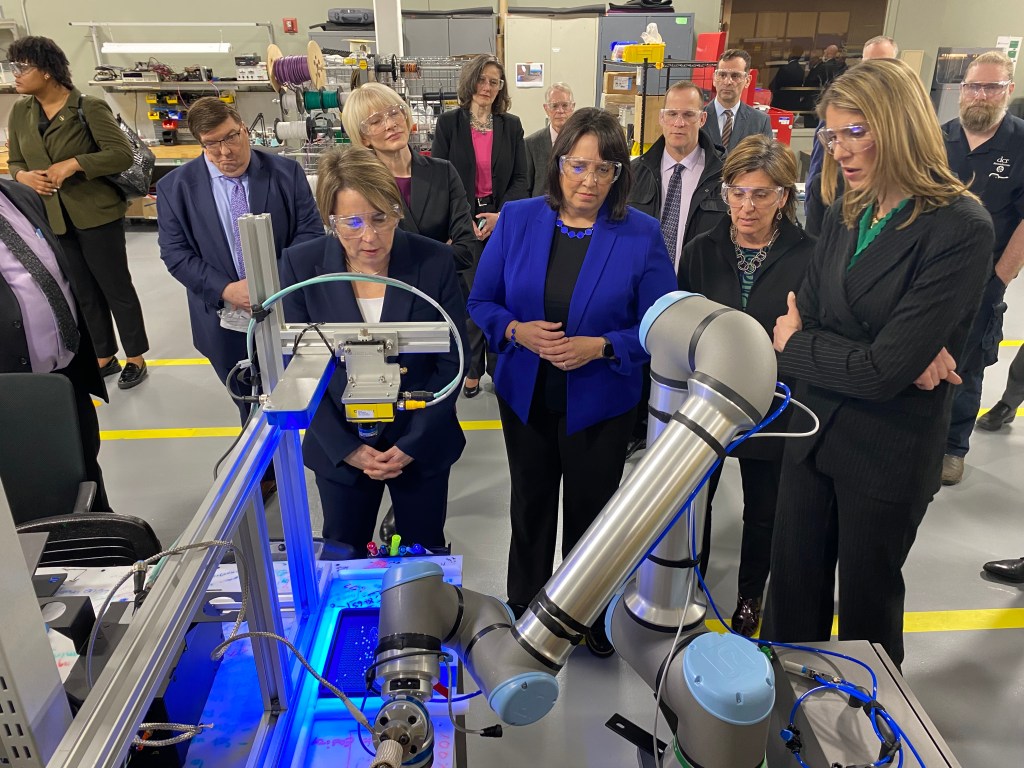
BILLERICA — Tucked away off Concord Road sits Building 1, the U.S. headquarters of Nuvera Fuel Cells. From the outside, the imposing structure looks like a warehouse. But inside resides a massive, high-tech manufacturing facility for the production of clean hydrogen fuel-cell technology.
On Thursday, Gov. Maura Healey, Lt. Gov. Kim Driscoll and the administration’s economic and energy leaders were present as U.S. Rep. Lori Trahan announced a $30 million federal investment in the company. She called the clean-energy technology “impressive” and “groundbreaking.”
“Massachusetts businesses are leading the way on the development and deployment of clean energy technology that we use to fuel our country’s future,” Trahan said. “An investment in the development and manufacturing of hydrogen fuel-cell engines that will power the trucks, buses and other heavy-duty vehicles our economy relies on.”
The U.S. Department of Energy describes a fuel cell as the chemical energy of hydrogen or other fuels to cleanly and efficiently produce electricity.
If hydrogen is the fuel, the only products are electricity, water and heat. Fuel cells can provide power for systems as large as a utility power station and as small as a laptop computer.
“Fuel-cell engines emit nothing more than water when hydrogen is consumed through them,” Trahan said. “The benefits of this investment will be significant for Nuvera, for our region and for our planet.”
The state and federal delegation toured the facility with CEO Lucien Robroek and Chief Operating Officer Neil Gillen, including a demonstration of using robotics to assemble component parts in the manufacturing of the fuel cells.
An onsite clean room used to assemble the fuel-cell stacks, which are the heart of a fuel-cell power system, was kept at 78% humidity because, Gillen said, “Some of the material actually distorts as the humidity drops. To maintain a wrinkle-free platform, we elevate the humidity.”
Forklifts, using the company’s technology, were visible around the site, which Gillen said is “deployed around the world.”
As an example, Town Manager John Curran said the Home Depot distribution center, that opened on the other side of Billerica two years ago, is filled with forklifts powered by Nuvera’s fuel cells.
Nuvera broke ground in Billerica in 2007. Robroek said the technology was ready for serious production and the Bipartisan Infrastructure Law funding would help drive that revolution.
“Sometimes it’s very lonely in this clean energy world working on stuff,” he said. “We think this is going to be the new technology in the world, and now we can make that happen.”
The funding will support the hiring of 20 additional employees, including both engineering and project professionals as well as entry-level workers, and the expansion of their career advancement programs. Additionally, the funding will help Nuvera expand its manufacturing floor space and purchase additional equipment to expedite the development and manufacturing processes.
Both Trahan and Healey had come directly to Nuvera from UMass Lowell, just nine miles away, where they were present for the announcement that Draper Laboratory would be an anchor tenant in UMass Lowell’s Lowell Innovation Network Corridor project.
The Cambridge-based nonprofit engineering innovation company will locate a microelectronic division in the Wannalancit Mills, the start of a larger investment as the LINC campus gets built out.
Whether microelectronics or hydrogen fuel-cell technology, Healey said the commonwealth was leaning into a move away from fossil fuels and toward innovative technologies.
“The race is on from lab to fab and scaling that up,” she said. “Drive down greenhouse gas emissions. We’ve been a state of innovation and entrepreneurship. We own the world when it comes to life sciences. And we want to own the world when it comes to climate tech innovation. That’s what we’re going for.”
As a part of her administration’s Mass Leads Act economic development bill, Healey proposed a $1 billion, 10-year climate tech initiative to make Massachusetts the climate innovation lab for the world.
“We want Massachusetts to win. We want Massachusetts to be first,” the former college- and professional-level basketball player and attorney general told a large group of Nuvera employees. “This is important stuff. We want you to succeed and succeed quickly.”
Nuvera is one of five companies across the 3rd Congressional District awarded a total of $94.5 million in funding from the Bipartisan Infrastructure Law to support the creation and deployment of American-made clean hydrogen fuel-cell technology. Also receiving funding are: AvCarb, of Lowell, $10 million; Cabot Corp., of Billerica, $5.02 million; Electric Hydrogen, of Devens, $46.3 million; and Plug Power, of Concord, $3.2 million.
The Bipartisan Infrastructure Law, as well as the Bipartisan CHIPS and Science Act and the Inflation Reduction Act, are part of President Joe Biden’s Investing in America agenda that was passed in Congress by the Massachusetts congressional delegation.
To date, Massachusetts has received more than $7 billion in federal investments from these laws, including more than $361 million to accelerate the creation and deployment of clean energy technology, clean buildings and clean manufacturing.
“The energy field is expanding quickly,” Gillen said. “We’re on the forefront of technology and we’re driving to make a positive impact for the planet. Future generations are depending on us to solve the problems of today and our technologies are enabling clean energy solutions.”
